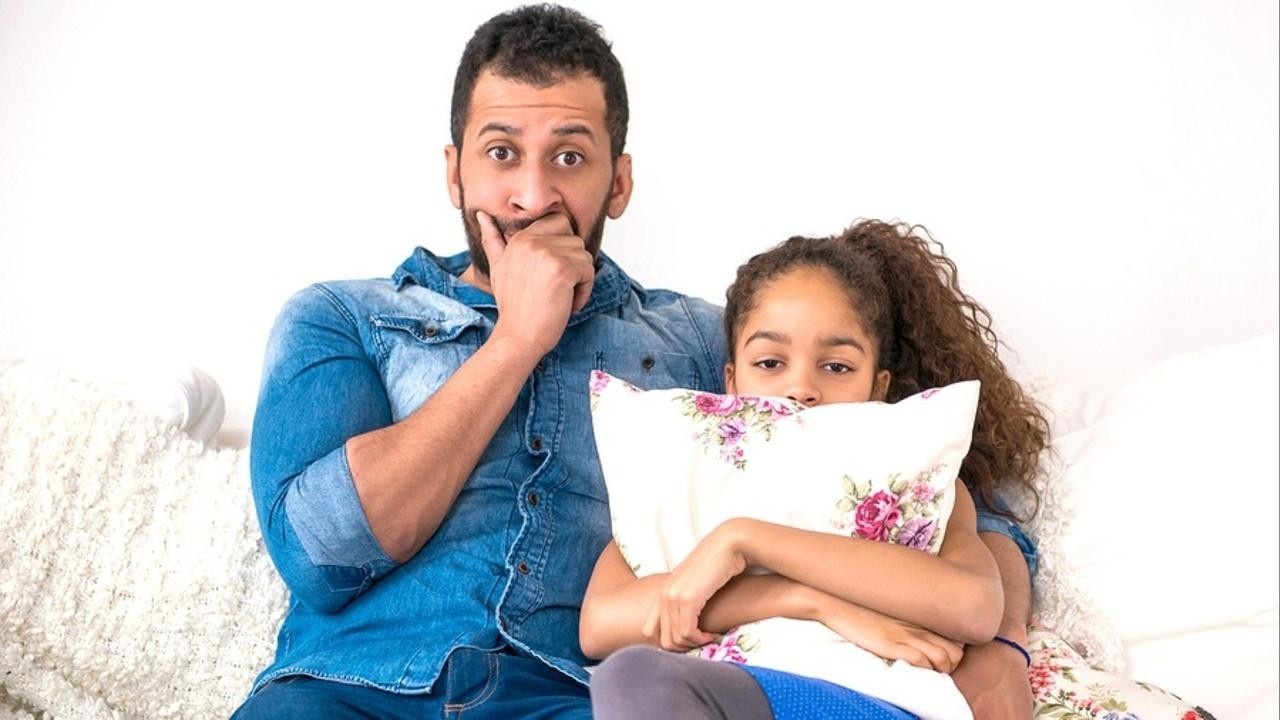Myths that STOP Parents from Talking About Sex

Parents often want to know when is the best time to start talking to their kids about "it". However, it is far too easy to hesitate and wait when there are so many myths and facts that get mixed up and make us fearful to get this important conversation started. Should you wait till your child has questions, for school to do it, or for puberty to happen?
I wanted to address some of the most common concerns that I have heard over the years doing talks that could stop you from having conversations with your kids. Here are the top 10.
1. Won't talking about sex make kids want to grow up faster?
One hesitation or belief I have heard is that talking about sex makes kids seem older. That they become women or men after "THE Talk" or that it makes them less innocent in some way. This is simply not true. If anything, talking about sexuality early will help keep your child's innocence by protecting them from sexual abuse or exploitation.
Sex is an adult thing, this is true. Knowing the p...
Talking to Kids About Consent
With the rise of the Me Too movement and allegations of sexual misconduct against many high-profile figures flooding our current events many parents are wondering how to talk to their kids about consent. It is not as tough of a conversation as you may believe. Here is a quick guide to help you feel confident and get started talking today.
Starting Early With Younger Kids
Helping kids understand consent (permission) early and understand their bodies belong to them makes it much easier to discuss sexual consent as they get older. The behaviors and mindset you help your child create have the power to be carried with them into adulthood. Here are some important lessons to pass on to your kiddos. You've got this parents!
Begin with teaching children that their bodies belong to them and that a person needs to ask permission before touching their body. This includes hugs, kisses, holding hands, tickling, doctor visits, bathing, bathroom help, etc. As kids get a bit older and are capable ...
Explaining Periods to Your Son

Explaining a Girl's Period to Your Son
If you have a son you may be wondering what to tell him about girls and their puberty changes. It is important to talk to your boys about what girls experience as they will always have females in their lives. From their mother, sisters, friends, cousins, colleagues and maybe even a daughter someday. It's important to raise empathetic and kind boys that respect women. In order to do that fully, boys need to understand girls better which includes both their physical and emotional differences.
Contrary to popular belief, the earlier you start talking about puberty the easier it can be. There are many opportunities for talking about periods with boys. Your son may be in the bathroom with you and see you changing a pad or tampon. He may ask what you are doing or why there is blood down there. Maybe you are watching TV as a family and a commercial for feminine hygiene products comes on and you could ask him if he knows about the products. Teachable ...
Movie Review - Eighth Grade

The film "Eight Grade" shows adolescents as it is for many pre-teens, directed by YouTube star Bo Burnham, about going through adolescence. In this extremely realistic drama (not your typical Hollywood movie), a socially awkward teen girl navigates the painful territory between middle school and high school.
This movie while edgy has a brave and hopeful main character and delivers messages about self-love and setting boundaries. There's so much here for parents and their teens to unpack, from mean-girl behavior and too much/inappropriate screen use to the importance of being careful around older teens (particularly for girls) and saying no to unwanted sexual advances. Ultimately, it also promotes open communication between teens and their parents, as well as courage, since Kayla learns to love and speak up for herself. It is rated "R", but most reviews say it is appropriate for 14 and up. Read on to see if it is right for your family to watch together.
Every child is different and...
Utilize & Create Teachable Moments

What is a teachable moment?
A teachable moment is an opportunity that you find to say something brief about sexuality (or any topic really) that might affirm a value important to you, or provide accurate information, or express the way you feel about a situation. Look for organic and real opportunities to talk about sexuality, relationships, gender, and more. TV and movies are loaded with them. The news and social media is another easy source of plentiful material. Is there a neighbor or a family member getting a divorce or that is pregnant? A friend from school that was adopted or has same-sex parents? Look for things in your child's everyday environment to bring the subject up. If that doesn't work, create your own teachable moments. Buy a book, movie, or watch a YouTube video that can help you broach the topic.
Here are some ideas for great everyday moments that could help you spark a conversation:
- Pets - If you have an animal in heat, pregnant, or exhibiting mating beh ...
Dads, Daughters, and Puberty!

Hey Dads!
If you have a daughter I'm willing to bet that as she grows up into a woman there are a ton of concerns, hesitations, and questions you may encounter along the way. It can be difficult and awkward to watch your little girl develop. She will begin to change emotionally and physically, have more crushes, and soon begin to date. Dads play a HUGE role in raising sexually healthy girls and I wanted to provide some pointers to guide you along the way.
Why I'm Blogging On This
As a teenager, I was starving for my father's presence and attention. My Dad was a Snap-On Tool Salesman for 30 years and worked from 9am-9pm Monday thru Friday. On weekends he worked around the house and garage mostly and a few times a year we would go camping in our motorhome. My Mom stayed at home and was mostly responsible for raising me. My Dad was an excellent provider and I mostly remember talking to him growing up when I was in trouble or needed money.
I was a good student and athlete, but I ...
Talking to Your Kids About Sexual Abuse

Any parents worst nightmare would be for their child to be sexually abused. Unfortunately, this is far too common, but the good news is there are many things parents can do to help minimize this risk by knowing the warning signs, talking to your kids early about prevention, and being savvy.
The Magnitude of the Problem
Did you know that...
- One in three girls and one in seven boys are sexually abused before age 18. (1)
- It is estimated that more than 300,000 children are sexually abused every year (2)
- In 90% of child sexual abuse cases, the child knows and trust the person who sexually abuses them. (3)
- One if five adults report that they were sexually abused as children, an experience that increases vulnerability to depression, and other difficulties. (4)
- More than 85% of adults who were abused say they never reported the abuse to authorities. (5)
Adults have to learn to recognize when people are acting inappropriately around children and to speak up before a child is harme...
What Kids Need to Know About Sex and When!

Parents want and need to talk to their kids about sex and growing up but may appreciate some guidance on what kids need to know and when. Here is a walk through of the stages and ages of what experts recommend to discuss.
0-2 Years Old
Believe it or not sexuality education really begins at birth. As parents you will be the main role model for healthy relationships. Your child is learning about love, safety, and how to trust others. From 0-2 years old you'll want to positively acknowledge your child’s exploration of their body. But discuss that this is a private, not public, behavior. It's important to touch our private parts, at private times, in private places. When explaining all the body parts you'll want to use correct terms. This can be the first line of defense against sexual abuse. If you use nick names for the body parts be sure to use the "adult" words as well, like penis or vagina. This is such a fun and exciting time to be a parent.
3-5 Years Old
Age 3-5 ...
How to Talk to Your Kids about Porn

There's no sugarcoating it: It's likely your kid will come across porn online, even through completely innocent searches. In all honesty, haven't you come across adult content when searching for something unrelated? I once looked up Girl Scout cookies under Google images and stumbled across some different "cookies" I wasn't looking for if you know what I mean? Parents may find themselves confronting this issue much sooner than imagined, with kids who may not even understand exactly what sex is yet. We've created an amazing toolkit to help parents have the porn talk. Request it here.
Not surprisingly, reports on porn use have shown an upswing of use during COVID. Even if we install blockers and software to limit their exposure we have to assume that they won't work 100% of the time and we can't control all devices kids come in contact with. In Peggy Orenstein's popular book Boys and Sex she writes, "Porn raises the question about how young people's erotic imaginations...


